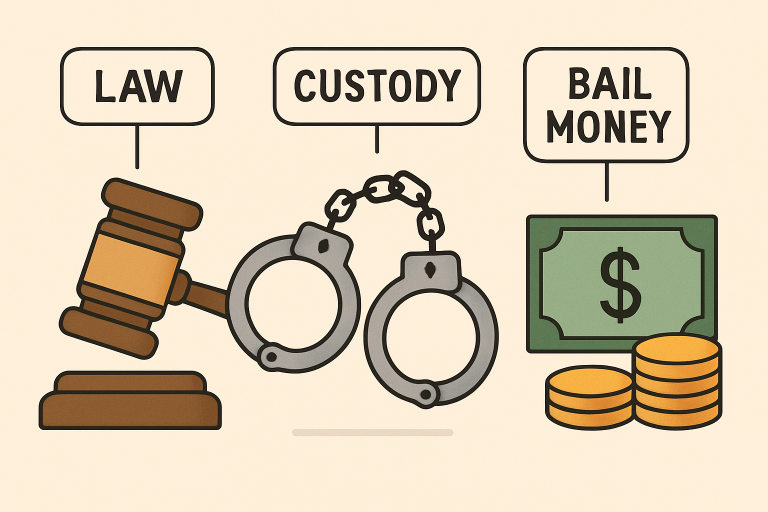What Is a Bail Bond and Why Does It Exist?
Bail bonds act as financial guarantees enabling defendants to await court proceedings outside jail. When someone is charged with a crime, a judge typically sets a bail amount to ensure the defendant’s future appearance in court. In many cases, the set bail is too high for the defendant or their family to pay out of pocket. This is where working with a surety bail bondsman Yadkin, NC becomes crucial, as they can cover the bond for a fee, allowing the defendant to regain their freedom while their legal matters are pending.
The core purpose of the bail bond system is to strike a balance between upholding public safety and protecting an individual’s right to prepare their defense from home, whenever appropriate. Bail bonds ensure the defendant’s release is conditional on legal compliance, not contingent on their financial resources alone. If the defendant adheres to all court-mandated appearances and requirements, the process concludes smoothly for all parties involved.
The Role of Bail Bond Agents
A bail bond agent is an essential bridge between the accused and the courts. When the defendant or their loved ones cannot afford the full bail amount, the agent offers a surety bond to the court as a promise that the defendant will comply with all judicial directives. The agent charges a non-refundable percentage of the total bail amount for taking on this risk. Regulatory oversight at the state and federal levels helps protect the interests of defendants and the broader public by enforcing ethical conduct and business practices among bondsmen.
Step-By-Step Guide to the Bail Bond Process
- Arrest and Booking: The accused is taken into custody, and law enforcement records personal and case details.
- Bail Hearing: A judge determines whether bail is appropriate and, if so, the amount, considering factors like the defendant’s criminal history, risk to others, and likelihood of fleeing.
- Contacting a Bail Bond Agent: When the bail amount exceeds what the defendant’s family can reasonably pay, friends or family reach out to a licensed agent.
- Payment and Paperwork: The agent requires a fee and sometimes collateral (often property or assets). Once paperwork is complete, the agent issues a bond to the court to guarantee the defendant’s return.
- Release: The defendant is released from custody, provided they commit to future court dates and any additional conditions imposed by the court or bondsman.
Common Myths About Bail Bonds Debunked
Misinformation about bail bonds can lead to costly mistakes. One common myth is that agents can negotiate a discounted fee or refund part of their service charge. In reality, regulations standardize the percentage charged (typically 10-15% of the bail), and these fees are always non-refundable. Another misconception is that bail money goes back to the defendant if they are found not guilty; in cases involving an agent, the fee compensates the agent for assuming risk, not as a deposit against the bail amount. Failure to attend court appointments can result in severe consequences, including loss of bail funds or pledged collateral, and potentially additional criminal charges. 
Bail Bonds and the Legal System: A Delicate Balance
Bail bonds are pivotal in balancing a defendant’s constitutional rights against the need for judicial accountability and public protection. For nonviolent or low-risk offenders, these bonds enable a return to normalcy—continued employment, family obligations, and the ability to participate more fully in legal defense. However, critics point out systemic inequalities, especially for lower-income communities. Many states now consider policy reforms or pilot alternative solutions to address these disparities, such as risk-based assessments.
Tips for Choosing a Bail Bond Agent
- Verify the agent’s licensing and accreditation as mandated by your state.
- Read recent client reviews and consider requesting direct references.
- Insist on clarity—ensure all terms, conditions, and costs are discussed and documented before signing any contract.
- Be wary of agents who promise extraordinary discounts or outcome guarantees.
- Shop around to compare agents and fees, making an informed decision that aligns with your needs and budget.
What Happens After Posting Bail?
Posting bail is just the start of the journey. The defendant is legally required to attend every scheduled court appearance—missing even one can result in immediate forfeiture of any bail or collateral pledged, and additional legal troubles may follow. Courts or agents often impose further conditions, such as regular check-ins with the bondsman, travel limitations, or completion of court-mandated programs. Meticulous organization and prompt communication with your bondsman and legal representative are essential for fulfilling these responsibilities and minimizing future risk.
Looking Ahead: Trends and Future Considerations
The bail bond landscape is undergoing significant evolution. Recent national and local reforms are designed to counteract financial inequity while holding defendants accountable. Technology is making its mark, too; many jurisdictions now use platforms for automated court reminders or allow online processing of bail payments. Empowering defendants and families with knowledge of these trends is vital as new practices and regulations emerge. Staying informed and working closely with experienced bail professionals ensures the best possible outcomes in an ever-shifting legal environment.

